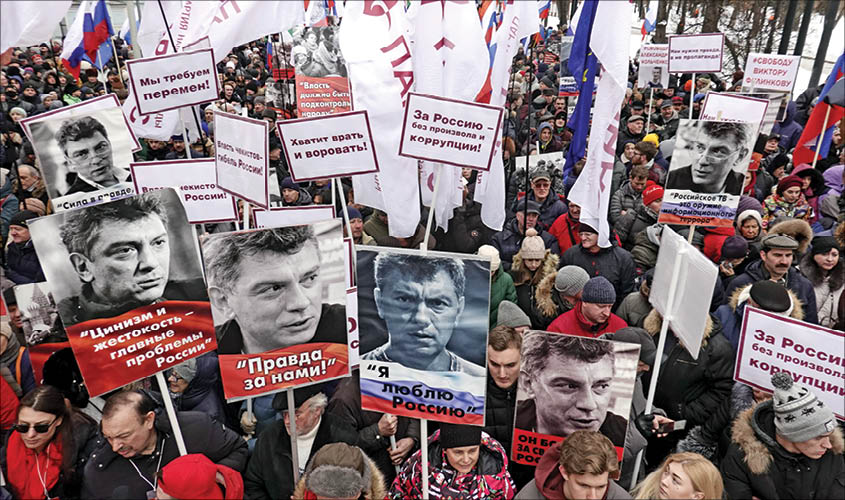What if Boris Yeltsin had chosen Boris Nemtsov as his successor, as he had said he would, instead of Vladimir Putin?
London: Boris Nemtsov was a phenomenon. Assassinated four years ago, he was too dangerous to the leadership in Russia.
I met Boris on two occasions. The first was in 1993, when, as a Moscow diplomat, I led a delegation to Nizhny Novgorod. The Soviet Union had collapsed just 18 months before and in the euphoria of freedom he had been elected the first Governor of that great city at the age of 32, the youngest of post-Soviet Russia. During the meeting he mesmerised us with his command of local and national politics. His charismatic personality assured us that if he was the face of the new Russia, the future was indeed bright for that great country. In the chaos of the Yeltsin years, the fortunate people of Nizhny Novgorod found that under Nemtsov the factories ran, wages were paid and the local economy grew.
On the second occasion, I accompanied Margaret Thatcher, who had recently stood down as Prime Minister and was making a private trip to Moscow. The fact that she specifically requested to go all the way from Moscow to Nizhny, a distance of 250 miles, just to visit Nemtsov, spoke volumes of what she thought of him. Again, Boris dazzled Margaret with his brilliance. Afterwards, she told me that her hopes were extremely high for the future of Russia.
After six years as Governor in Nizhny, Nemtsov was appointed First Deputy Prime Minister of the Russian Federation under Boris Yeltsin, with special responsibility for reform of the energy, housing and social sectors. He was extremely popular and Yeltsin even introduced him to Bill Clinton as his chosen successor. So what went wrong?

For Nemtsov there were two issues: he was vehemently against corruption, and he wasn’t a member of the KGB (later called FSB). He was therefore swimming against the tide. Over the years until his murder, he became a strong vocal critic of President Vladimir Putin whom he claimed was rolling back democracy. At the time of his death he was working on a report which allegedly proved that Russian troops were fighting alongside pro-Russian rebels in eastern Ukraine, something believed by the West, but strongly denied by Putin.
That’s the problem with criticising the Kremlin; your lifespan tends to be short. Take the case of Anna Politkovskaya, an award-winning investigative journalist who also got under Putin’s skin. Anna provided evidence that Vladimir Putin and the FSB were stifling civil liberties in order to establish a Soviet-style dictatorship, claiming that Russia is “hurtling back into a Soviet abyss”. In 2006, she was assassinated in Moscow at the age of 48.
A few weeks later, another assassination took place, but this time in London. Alexander (Sasha) Litvinenko, a former FSB officer and a strong vocal critic of Putin, met a business contact, Andrey Lugovoy, in a central London hotel. Unknown to Sasha, Lugovoy had slipped a deadly radioactive substance, Polonium 210, into his tea. Sasha soon became seriously ill and died an excruciating death three weeks later. Litvinenko had fled to the UK from Russia six years before, having presented Vladimir Putin, then head of the FSB, a portfolio of evidence allegedly linking the FSB, and by implication Putin, to corruption and organised crime. Lugovoy, now a member of the Duma, has since been decorated by President Putin.

Politically motivated assassinations do little to improve the image of a country. Neither do state seizures of business. When Yukos, then Russia’s largest oil company, was seized in 2004 following oligarch Mikhail Khodorkovsky’s fall from grace, President Putin transferred its assets to Rosneft, which has increasingly become a foreign-policy instrument of the State. The CEO of Rosneft, Igor Sechin, is now on Western sanctions lists as relations between Russia and the West soured following Moscow’s annexation of Crimea and the invasion of Ukraine.
This illustrates the problems of investing in Russia. The complex relationships between geopolitics, declining rule of law and government interference has resulted in a plummeting Foreign Direct Investment (FDI) in the country. FDI has been on the decline since 2013. While certain economic reforms have been made, administrative problems, extensive corruption and uncertainty about regional stability have remained major challenges. In its latest rankings, the World Bank places Russia below countries such as Azerbaijan, Kazakhstan and even Rwanda for “ease of doing business”.
How things would have been different had Boris Yeltsin chosen Boris Nemtsov as his successor instead of Vladimir Putin! Ruling Russia as he did Nizhny Novgorod, corruption would be no more than in Western countries and incoming business would be assured of equal justice. Russian citizens would have access to a variety of opinion on TV and the press, rather than being subjected to State controlled media feeding them only what it wants them to believe. There would be free and fair elections. Wealth would be distributed more fairly instead of the richest 10% owning 87% of all the country’s wealth. Russia is rated the most unequal of the world’s major economies. Not only would the quality of life of the average Russian citizen be substantially higher, but the life expectancy would almost certainly be greater. In 2016, life expectancy for Russian men was only 66.5 years, a full 14 years less than Japanese men.
Last month, four years after his assassination, thousands of people marched in cities across Russia to honour the memory of Boris Nemtsov. They were also mourning the loss of a Russia that might have been.
John Dobson worked in UK Prime Minister John Major’s Office between 1995 and 1998 and is presently Chairman of the Plymouth University of the Third Age.

